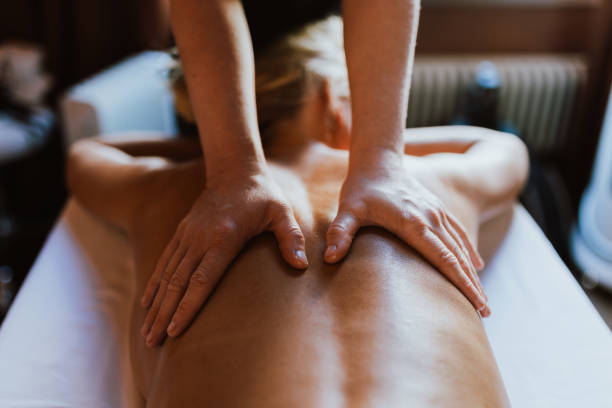The Science of Massage: Exploring the Endorphin and Dopamine Responses of Massages
A massage isn’t just a pleasant experience – it has real, scientific effects on our bodies. Massage can spark the release of endorphins and dopamine, two powerful hormones associated with pleasure, happiness, and overall well-being. Over the past many years, researchers have been studying the science of massage and how its effects on our physiology.
We all know that feeling of relaxation and satisfaction after getting a massage, but why does this occur? How does massage influence our body’s response to daily life? Understanding the science of massage and its endorphins and dopamine connections is key to understanding the full impact of a massage.
Before diving into the specifics, let’s review what endorphins and dopamine are and why they are important. Endorphins are natural opioids released by the central nervous system in response to things like physical pain and stress. They block pain signals from the brain and create feelings of euphoria, stress reduction, and well-being. Dopamine, on the other hand, is a neurotransmitter that helps regulate motivation, reward, and emotion. It is usually released as a response to something enjoyable or satisfying.
So, how do these two hormones play a role in massage? When we receive a massage, our bodies relax, our breathing slows, and endorphins are released. This endorphin response reduces stress hormones, boosts our immunity, and even reduces pain. When our muscles are manipulated by the massage therapist, an increased circulation of oxygen and nutrients occurs, triggering a dopamine response thats makes us feel further relaxed and energized.
Regular Massages and the Health Benefits they bring

Recent studies have further revealed that massages can significantly reduce levels of cortisol (the stress hormone, sometimes referred to as the “fight-or-flight” hormone) and increase prolactin, which is associated with relaxation and sedation. The science of massage shows that regular massage sessions can have beneficial health effects for people of all ages, including general stress relief and improved physical and mental wellbeing.
Apart from reducing stress hormones, the science of massage also suggests that it can have positive impacts on our mental health. Research has found that massage stimulates the release of serotonin, another neurotransmitter responsible for our mood and emotions. In a study published in the International Journal of Neuroscience, massage was seen to reduce depression and anxiety and improve quality of life.
Science has shown that massage can help ease muscle tension and promote better sleep. A recent study published in the journal Sleep Medicine concluded that massage therapy can improve both the quality and quantity of sleep in individuals with insomnia.
Massage therapy is a great way to reduce stress and anxiety, improve the quality of our sleep, and even reduce physical pain. Its ability to activate our endorphins and dopamine responses results in feelings of relaxation and well-being. Massage has become an essential part of a holistic approach to health and well-being and research will continue to uncover the many ways massage can benefit our bodies and minds.
1. Massage therapy has been associated with a number of physical benefits. Studies have shown that it can reduce muscle aches and pains, improve joint mobility and flexibility, and help with digestive issues. In addition, massage increases the circulation of both blood and lymph throughout the body, promoting better organ health overall. This can also help to reduce inflammation and promote healing from injury or illness.
2. Massage therapy has been linked to better sleep patterns. This is likely due to its ability to reduce tension, relax the body, and reduce stress hormones. Furthermore, massages can help you fall asleep faster and stay asleep longer, leading to improved quality of rest.
3. Massage therapy has become an increasingly popular form of alternative medicine. Many medical spas offer massage as a way to reduce stress and anxiety, and it is also a great complement to conventional therapies like physical therapy and chiropractic care.
4. It is important to note that massage therapy is not a “cure-all” and cannot replace traditional medical care. However, it can be used as an adjunct treatment for a variety of conditions and can be very beneficial in aiding recovery and improving overall well-being.
5. If you are considering massage therapy, it is important to talk to your doctor first. Some people may not be able to safely receive massage therapy due to certain medical conditions. Additionally, various massage techniques may not be appropriate or safe for certain individuals so it is best to talk to your doctor before starting any massage regimen.
6. Massage can also be helpful during times of grief, particularly when a loved one has recently passed away. A gentle massage can help to release energy and emotions, providing relief and comfort in times of sadness.
7. Massage can also be used to help with chronic pain management. Massage can help to relax muscles and decrease inflammation, reducing pain and helping patients cope more effectively with their condition. Additionally, massage can be used to help manage headaches, neck pain, and other forms of pain.
8. Massage therapy is also known to alleviate stress and anxiety. Massage can reduce cortisol levels and promote feelings of relaxation, making it an effective tool for managing stress and anxiety.
9. Massage can also be used to improve athletic performance. Studies have shown that massage can reduce muscle fatigue and improve coordination, leading to improved performance in athletes.
10. Massage therapy can also provide psychological benefits. Massage can reduce cortisol levels, which can help to regulate emotions. Additionally, massage has been linked to increased levels of dopamine and serotonin, two neurotransmitters responsible for regulating mood and emotions.


